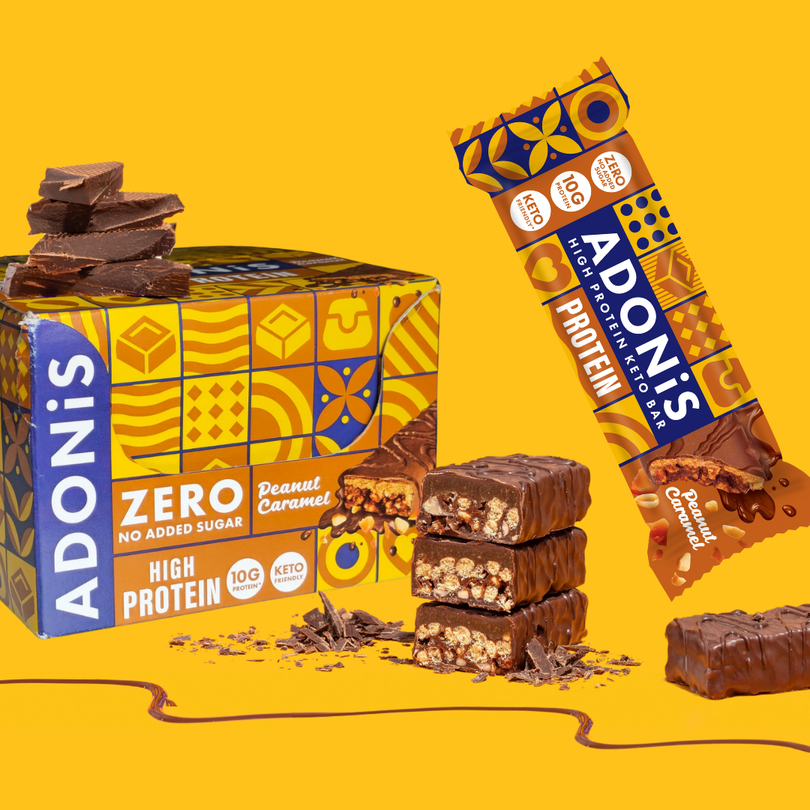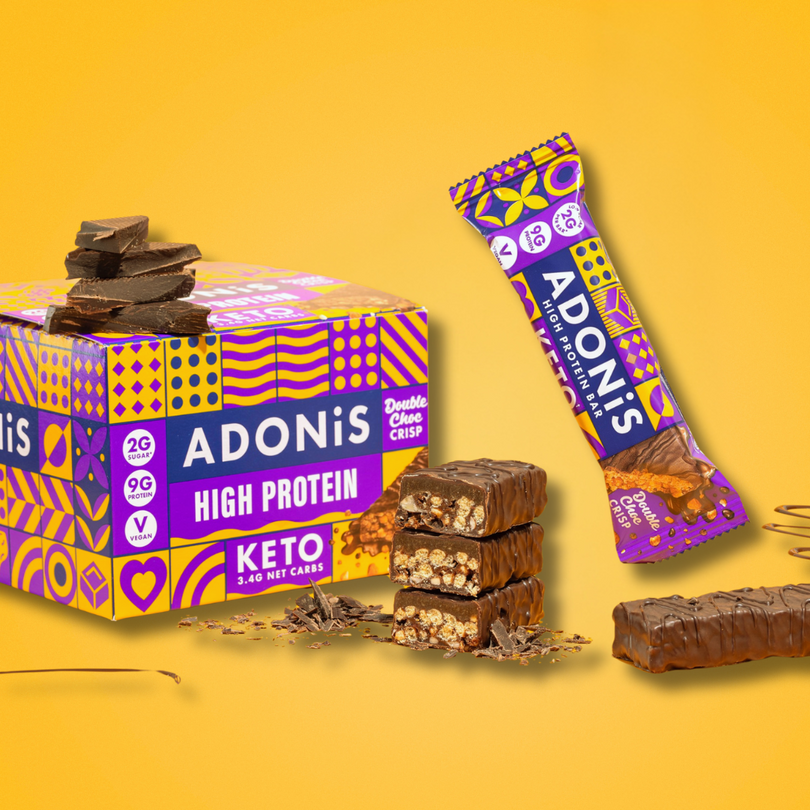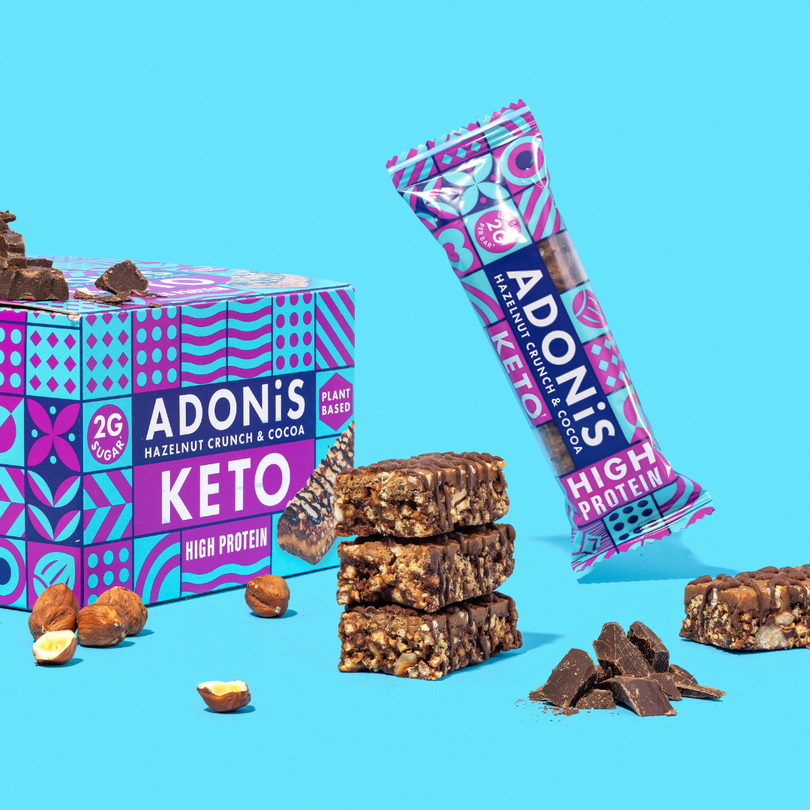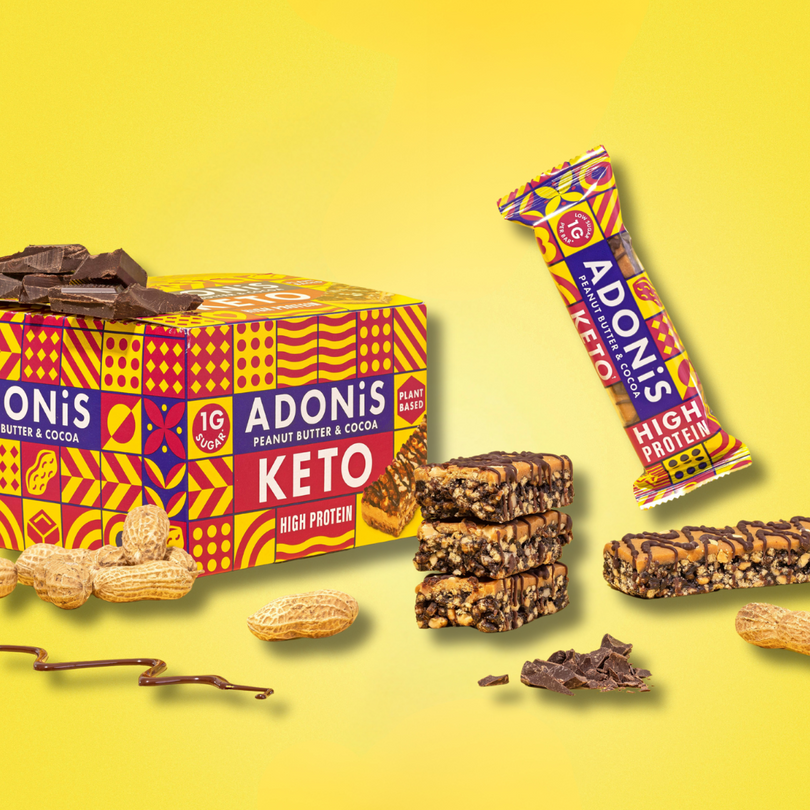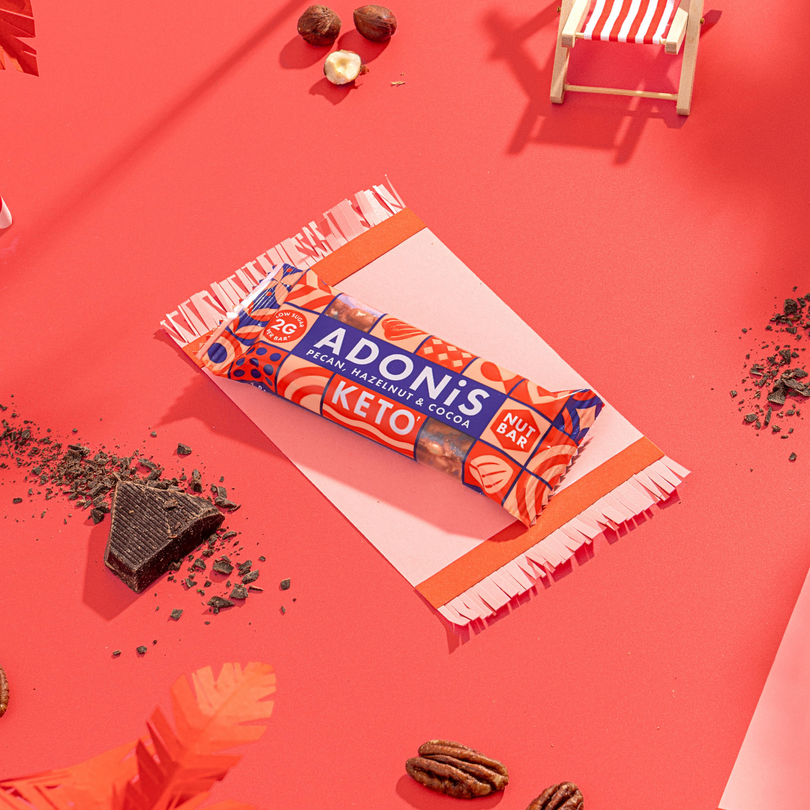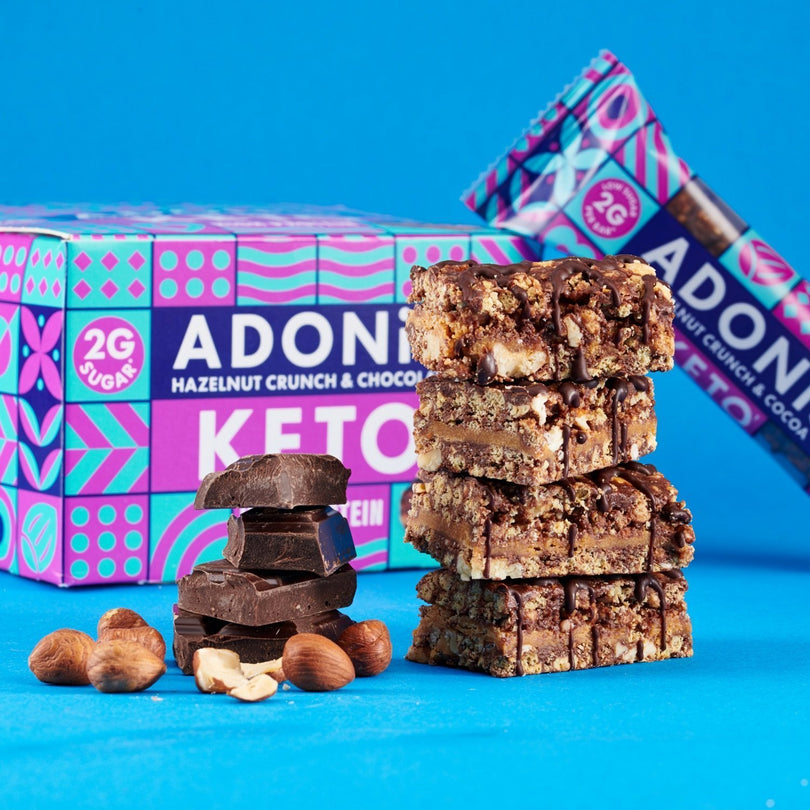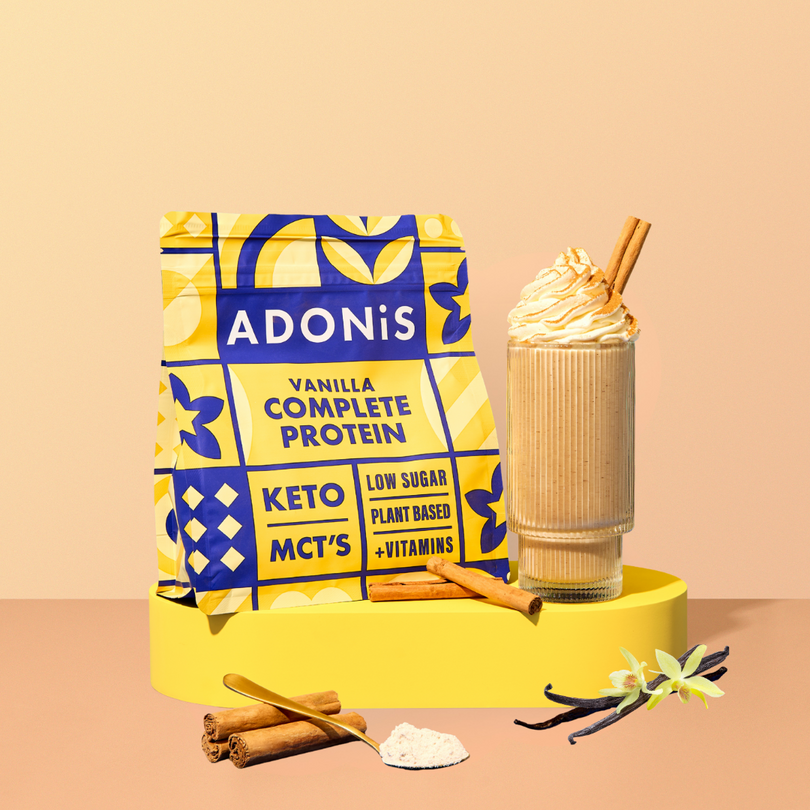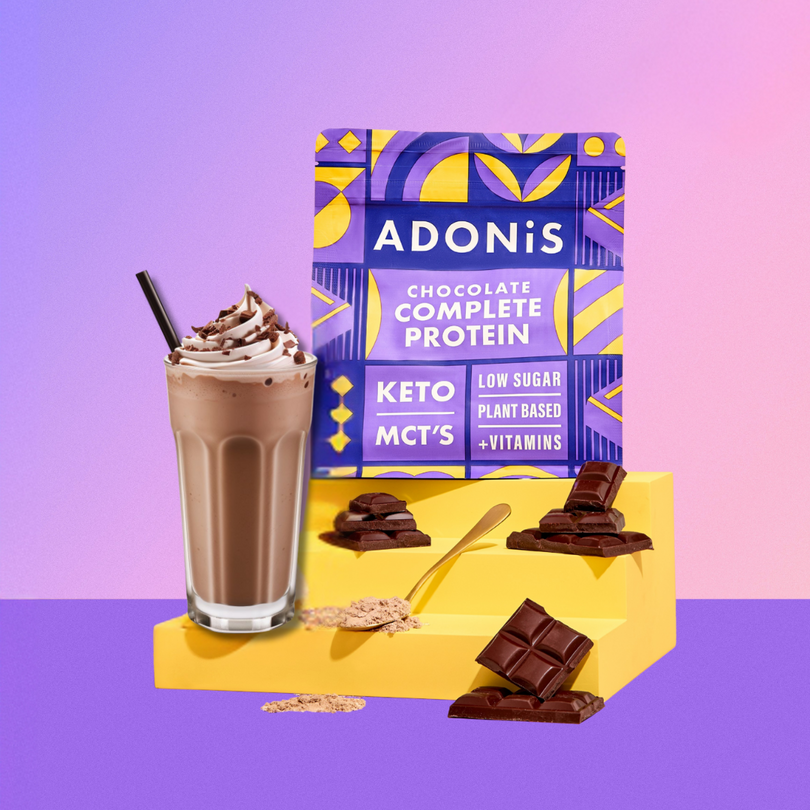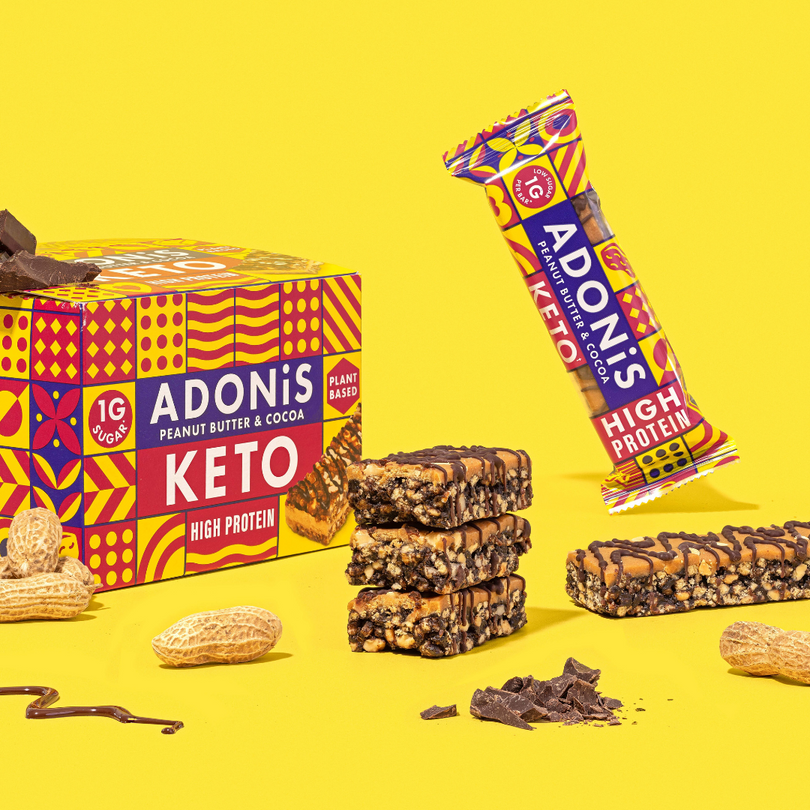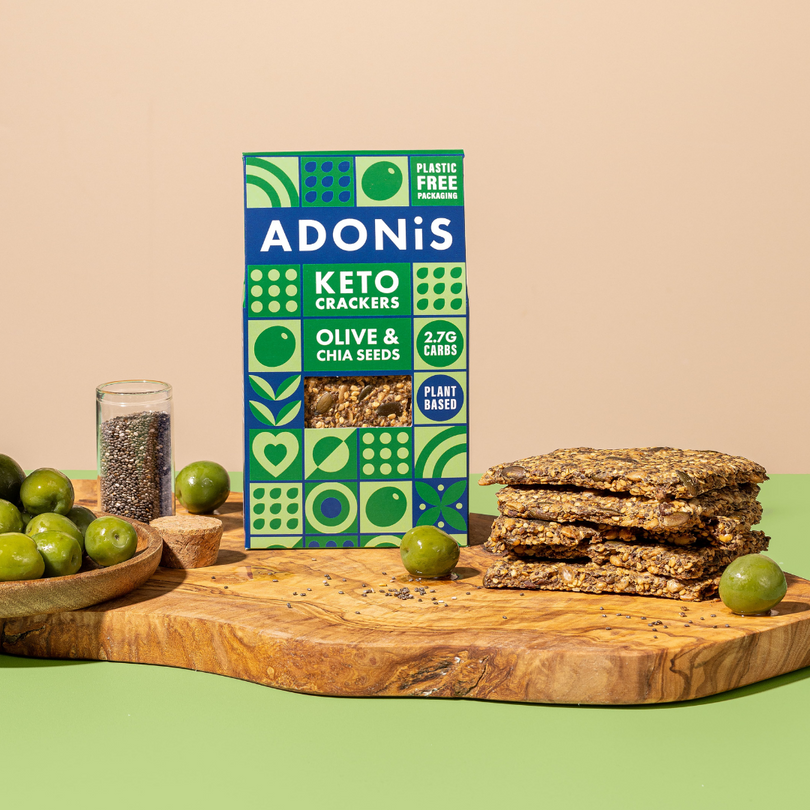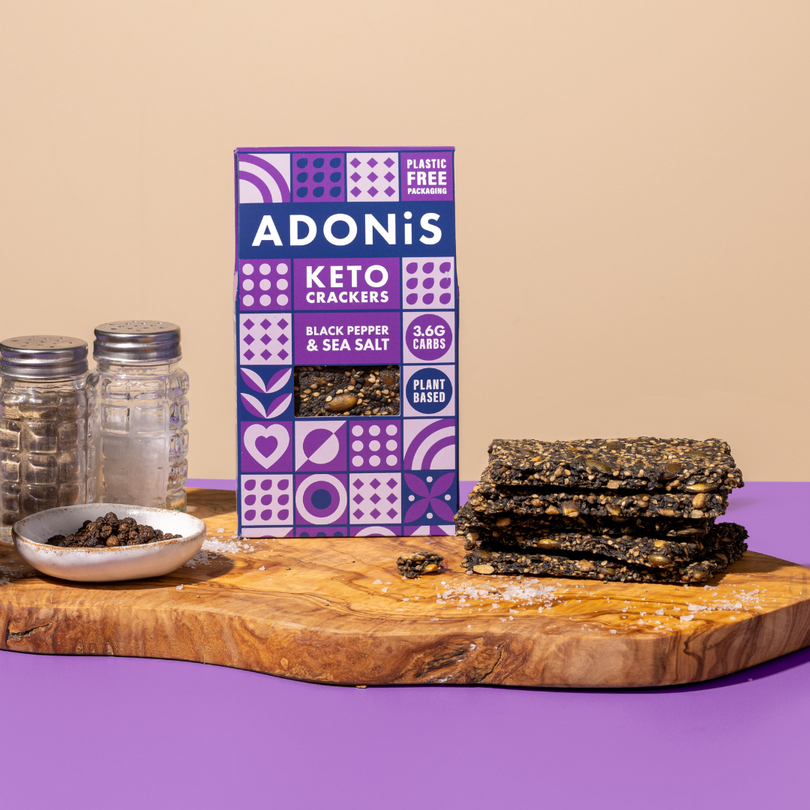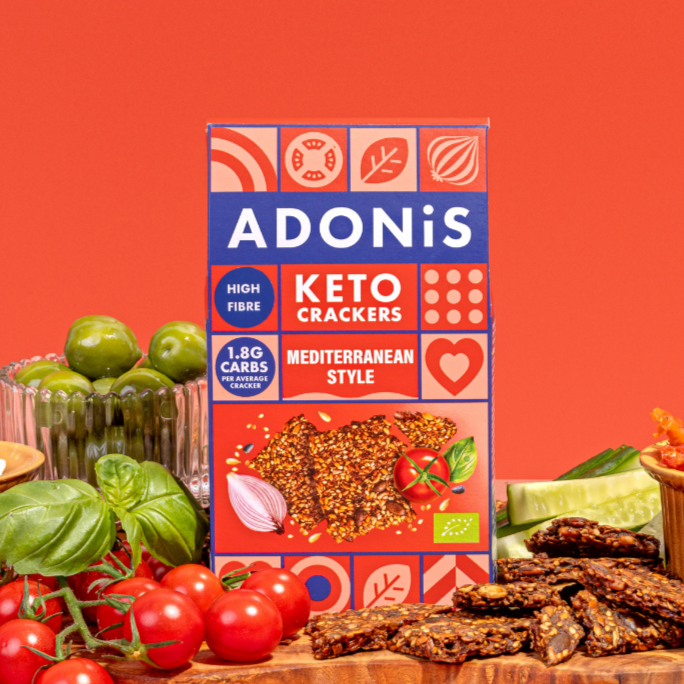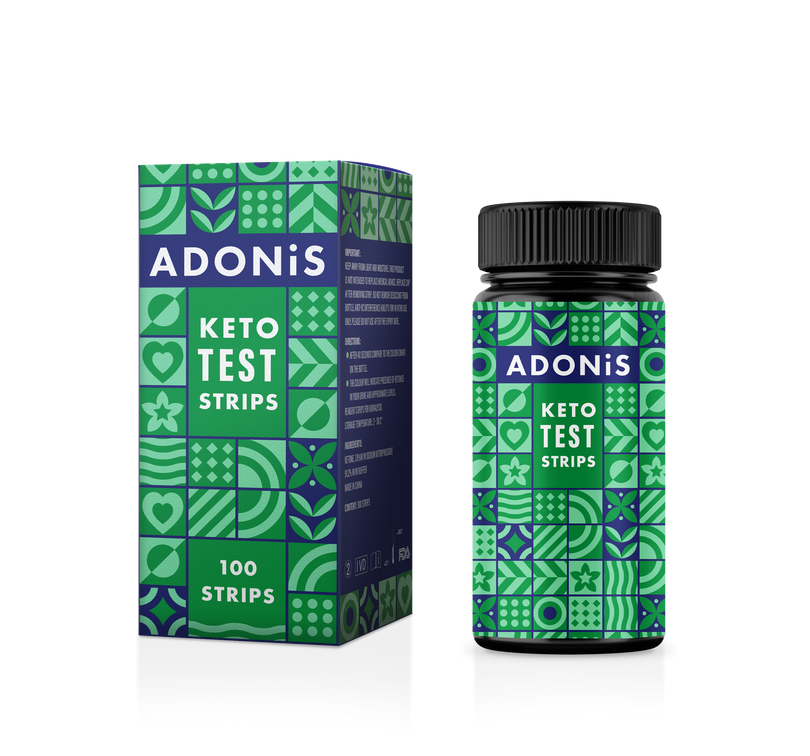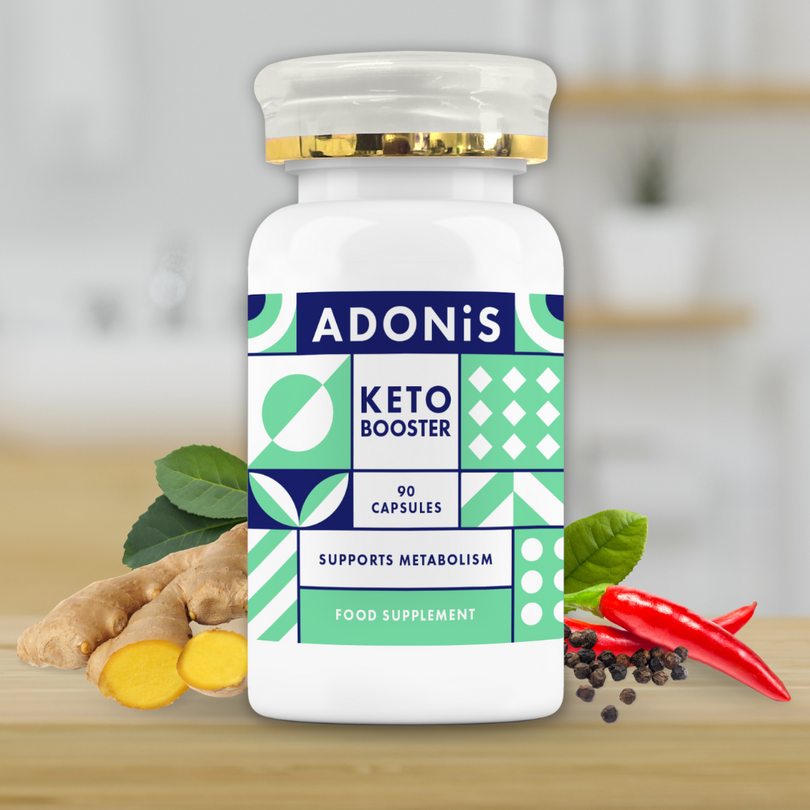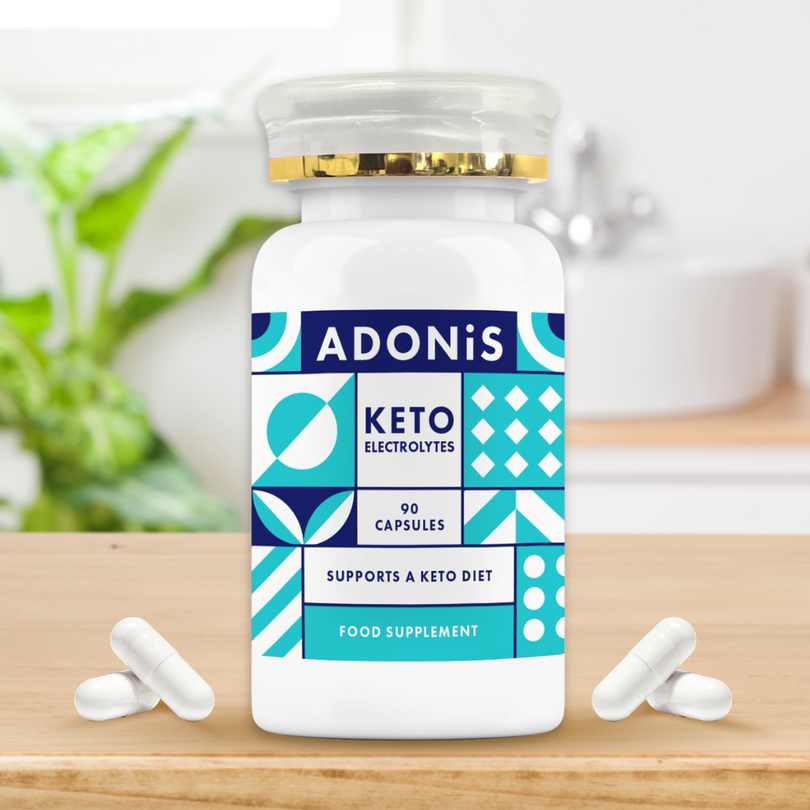THE BEST KETO SWEETENER TO ADD TO YOUR KITCHEN
9 min read
Following a keto diet involves eating a large quantity of healthy fats, a moderate amount of protein and only a small amount of carbohydrates. Unfortunately, alongside fibre and starch, sugar is one of the three types of carbohydrate.
If you have a sweet tooth, it can be hard to go without your favourite treats on keto. Here we will look at how low carb, keto-friendly sweeteners could help you satisfy your cravings whilst remaining in ketosis.
Which Sweeteners should I use on Keto?
The limitations on sugar and sweet treats can feel overwhelming when you start keto. Refined sugar is not recommended for keto. This is because giving the body a supply of glucose from the foods you eat prevents ketosis from occurring.
Because carbs are broken down into glucose in the digestive system, savoury carbohydrates are also off-limits. Eating carbs prevents a ketonic state from occurring, because glucose enters the bloodstream resulting in the liver stopping its production of ketone bodies.
Even though you know the science behind keto, when you’re craving something sweet it takes a lot of willpower not to break your keto diet. Luckily, low carbohydrate, sugar free, natural keto sweeteners could offer you a solution.
However, it is important to recognise the difference between natural and artificial sweeteners.

The Problem with Artificial Sweeteners

Some people choose to add an artificial sweetener to their tea or coffee, rather than a teaspoon of sugar. Sweeteners are often found in diet products, such as diet fizzy drinks or sugar free syrups. These commonly used sweeteners are often chosen because they are a low-calorie alternative to sugar, but still give a satisfyingly sweet taste.
However, not all sweeteners are created equal. Traditional sweeteners often contain ingredients that may not be healthy, including sucralose, saccharin and aspartame. Unfortunately, despite boasting low calorie benefits, scientists have actually linked artificial sweeteners to weight gain. Shockingly, there is also significant evidence that artificial sweeteners can cause brain tumours, bladder cancer and other health problems
.Aspartame is an artificial sweetener of particular concern. Aspartame is converted to methanol, which can lead to metabolic acidosis. This form of methanol toxicity can mimic multiple sclerosis, leading to a misdiagnosis of the medical problem. Although aspartame causes toxicity rarely, any occurrence is serious as metabolic acidosis is a potentially fatal condition.
When looking for a keto sweetener, or a keto-friendly sweet treat, it is important to carefully check the ingredients. A natural sweetener is likely to be far better for keto, and superior for your health in general.
Why are Sweeteners Needed on Keto?
When starting the keto diet, it can take some time to get your macros right to ensure ongoing ketosis. Although keto offers rapid initial weight loss, it is not a crash diet. Keto is a lifestyle choice, and it is important to see it as a long term dietary change right from the start.
Although it is possible to cut out sweet snacks and desserts for a couple of weeks, most people will find their willpower severely tested beyond this point. It is unrealistic to expect to cut out sweet treats forever. Knowing that you can indulge in the occasional keto-friendly indulgence now and again may help to keep you going with keto.

As you get used to a keto lifestyle, your taste buds are likely to change. A few raspberries in some natural yoghurt may seem far sweeter than they did when you were eating refined sugar every day. However, realistically fruit is a poor substitute for cake or ice cream, and having a few keto-friendly options tucked up your sleeve for celebrations is part of enjoying life to the full.
Keto sweeteners are naturally derived substances that taste sweet but are low in carbs and sugar. These sweeteners are often found in plants or fruits which can help to avoid the risks associated with artificial sweeteners.
What is a Keto Sweetener?
For a sweetener to be suitable for a keto diet, it has to be low in carbohydrates. This way, it has a very low calorie content and does not increase blood sugar levels. If the blood sugar levels remain the same, then the body does not need to produce insulin. A sweetener with a low Gi will prevent insulin levels from rising.
A sweetener that meets these criteria will allow you to enjoy something that tastes sweet, whilst remaining in a ketonic state for effective fat burning and weight loss.
Finding Safe Keto Sweeteners
Many people who start the keto diet do so for its numerous health benefits. You therefore want to be sure that any sweeteners you choose will keep you in ketosis and not cause any adverse health effects in the short or long term. Many people who follow keto are keen to find a natural sweetener.
Plant sugars that you might be considering on keto include stevia (from a herb), yacon (from a root) and monk fruit.

Sugar alcohols, also known as polyols, are found naturally in some plants including strawberries, plums and avocado. Despite their name they do not contain ethanol, so they are suitable for people who do not to drink alcohol. Sugar alcohols have a very similar taste and chemical structure to sugar, but they are not absorbed by the digestive system very well. This means that you can enjoy the sweet taste of sugar, whilst benefiting from consuming far fewer calories overall.
If you are keen to stick to a natural product, be careful of the clever wording of manufacturers. ‘Natural’ and ‘derived from naturally occurring compounds’ are not the same thing. Some manufacturers may modify natural compounds, resulting in a synthetic sweetener that is marketed in a way that makes it sound completely natural.
The sweetener you choose should be approved by the European Food Safety Authority (EFSA) to ensure it is safe for you to consume.
The Best Keto Safe Sweeteners
There are several sweeteners available to suit a keto diet. Here we will look at the benefits and potential drawbacks of the best sweeteners on offer.
- 1. Erythritol. Erythritol is a natural sweetener. It is a type of sugar alcohol or polyol. Polyols are commonly found in fruits and vegetables including mushrooms and grapes, as well as being present in soy sauce.
Erythritol is a low sugar choice, and is in fact the only sugar alcohol that is considered to be zero calorie. However, it boasts 60-80% of the sweetness of sugar, making it a great way to enjoy a sweet treat on keto. Occasionally, erythritol can leave a bitter taste in the mouth. If necessary, this taste can be masked when other delicious, keto-friendly ingredients are included in the snack or dessert.
Erythritol offers sweetness without the calories. This is possible because the body can metabolise very little of the sweetener, with most of the erythritol entering the bloodstream and then being excreted unchanged in the urine. Reassuringly, this also means that erythritol does not cause any change in blood sugar levels, insulin production, cholesterol formation or triglyceride levels.
Prior to leaving the body in the urine, erythritol acts as an antioxidant.iv This means it helps to protect the body against free radicals. Free radicals are known to damage cells, increasing the risk of diseases including some cancers. Erythritol may therefore help to prevent this damage.
Free radicals can also cause damage to the blood vessels. A study of diabetic patients found that erythritol helped to protect the blood vessels against damage associated with high blood sugar levels, therefore reducing the risk of cardiovascular disease in this group.
Erythritol does not cause dental caries. In a study that spanned three years and studied 485 children, erythritol sweets were found to be superior in minimising caries when compared to xylitol and sorbitol sweets. It also took longer for caries to form in the group who consumed erythritol sweets.
In long term studies, erythritol did not cause harmful side effects. Other sugar alcohols including xylitol and sorbitol can lead to unpleasant symptoms including diarrhoea, but erythritol does not cause this unwanted digestive side effect. However, when consumed in vast quantities, erythritol was found to cause stomach rumbling and nausea in one study.
At Adonis, we consider erythritol sweetener to be the healthiest and most effective sweetener for men and women following a keto diet. Erythritol is the only sweetener we use in our keto products, ensuring a delicious, satisfying taste without adding calories, causing side effects or upsetting the balance of ketosis. - 2. Xylitol. Xylitol is a natural sugar alcohol like erythritol. Xylitol is commonly used in sugar free chewing gum and mouthwash to give it a natural sweetness. Xylitol can also have a cooling effect which makes it a popular choice in mint-flavoured products.
Xylitol is produced from the woody part of corn cobs and from other fibrous plants. Unlike erythritol, xylitol is low carb but not zero carb. It therefore has a small impact on blood sugar levels and can cause the production of insulin to increase. If enough is eaten, xylitol has the potential to upset the balance of ketosis. If chosen, xylitol containing food products must only be consumed sparingly.
Unlike erythritol which passes through to the kidneys and urine unchanged, 50% of xylitol is processed by the bowel. Xylitol can therefore be responsible for unpleasant symptoms of digestive upset including excessive gas, abdominal bloating and diarrhoea. This can occur even when small amounts are eaten.
However, xylitol is enjoyed by some as it has a similar taste to sugar and contains around half the calories. Furthermore, xylitol is less likely to cause dental caries than table sugar, as it reduces the levels of the bacteria mutans streptococci within the plaque and saliva. - 3. Stevia. Stevia is a plant based sweetener derived from a shrub found in South America. Owing to its sweet taste, it is commonly referred to as candyleaf or sweetleaf. It has been used for its sweet properties for centuries.
Stevia is part of the low or no calorie sweetener bracket. It therefore does not increase blood glucose or insulin levels, which may help you to stay in ketosis. In addition, in an animal study, stevia was found to reduce the markers associated with diabetes by 5%.
On the surface, it is a suitable sweetener for the keto diet.
However, there is some concern that adding stevia to your diet may cause heightened feelings of hunger later in the day. This could increase your risk of overeating or letting your keto diet slip, putting you at risk of losing your ketotic state and hindering weight loss. - 4. Monk Fruit Extract. Monk fruit extract is a sweetener that is naturally derived from the monk fruit plant found in Asia. Although it contains natural sugars, these are stripped out to make monk fruit extract. Removing natural sugars reduces the calories, but the extract still tastes sweet. This is because monk fruit contains mogrosides. Mogrosides are calorie free antioxidants that taste sweet.
Like other antioxidants, mogrosides scavenge free radicals within the body that could otherwise harm cells. This may help to reduce inflammation and the risk of medical conditions including some cancers.
Monk fruit extract is suitable for a keto diet as it is low calorie and does not cause an increase in blood glucose. However, some people find the taste of monk fruit off-putting. It has an unusual flavour which is different to other sweeteners and certainly distinguishable from sugar. Monk fruit extract can also leave an aftertaste which can be unpleasant. For some, this limits the practicality of enjoying this natural sweetener.
Final Thoughts
Keto-friendly sweeteners are the perfect way to enjoy the occasional sweet treat without upsetting your progress on the keto diet.
Erythritol is a superior sweetener for keto-dieters, as it does not increase your calorie intake, contains antioxidants to boost cell health, and does not cause any unwanted digestive side effects.
To view our range our range of keto snacks and treats, visit our online shop today.
References:
https://www.ncbi.nlm.nih.gov/pmc/articles/PMC3198517/
https://www.ncbi.nlm.nih.gov/books/NBK499830/
https://www.efsa.europa.eu/en/topics/topic/sweeteners
https://www.ncbi.nlm.nih.gov/pmc/articles/PMC5756564/
https://pubmed.ncbi.nlm.nih.gov/8039489/
https://www.cancer.gov/publications/dictionaries/cancer-terms/def/free-radical-scavenger
https://pubmed.ncbi.nlm.nih.gov/19632091/
https://pubmed.ncbi.nlm.nih.gov/24852946/
https://pubmed.ncbi.nlm.nih.gov/8933643/
https://pubmed.ncbi.nlm.nih.gov/16988647/
https://pubmed.ncbi.nlm.nih.gov/27117004/
https://pubmed.ncbi.nlm.nih.gov/31060040/
https://www.ncbi.nlm.nih.gov/pmc/articles/PMC5320817/
https://academic.oup.com/jn/article/148/7/1186S/5049670
https://pubmed.ncbi.nlm.nih.gov/29890969/
https://pubmed.ncbi.nlm.nih.gov/27956737/
https://pubmed.ncbi.nlm.nih.gov/32861489/

